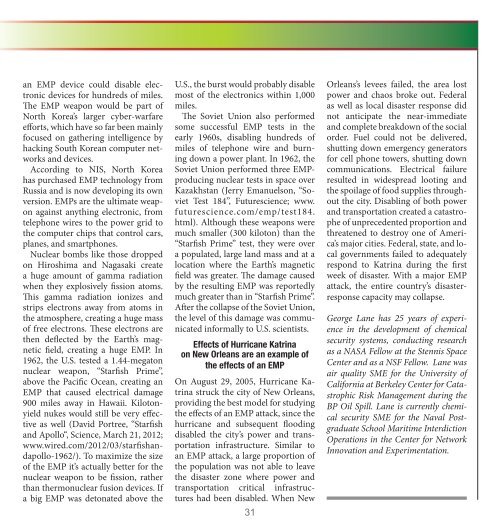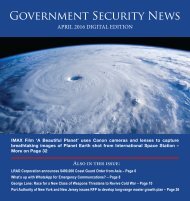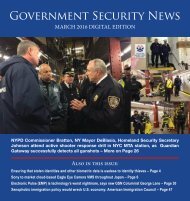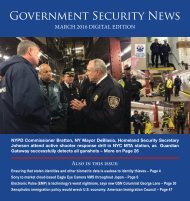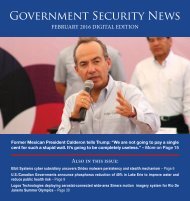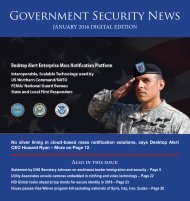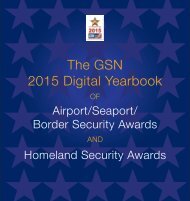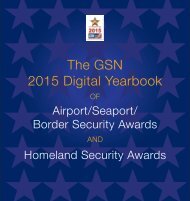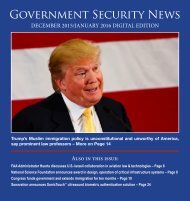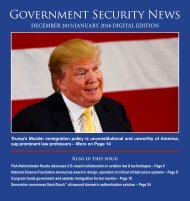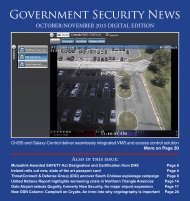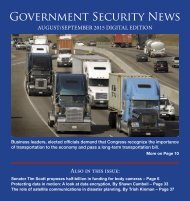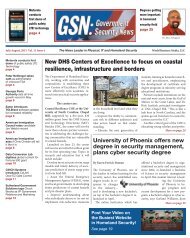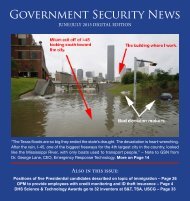GSN March 2016 Digital Edition
Create successful ePaper yourself
Turn your PDF publications into a flip-book with our unique Google optimized e-Paper software.
tronic<br />
devices for hundreds of miles.<br />
<br />
North Korea’s larger cyber-warfare<br />
efforts, which have so far been mainly<br />
focused on gathering intelligence by<br />
hacking South Korean computer networks<br />
and devices.<br />
According to NIS, North Korea<br />
<br />
Russia and is now developing its own<br />
on<br />
against anything electronic, from<br />
telephone wires to the power grid to<br />
the computer chips that control cars,<br />
planes, and smartphones.<br />
Nuclear bombs like those dropped<br />
on Hiroshima and Nagasaki create<br />
a huge amount of gamma radiation<br />
when they explosively fission atoms.<br />
This gamma radiation ionizes and<br />
strips electrons away from atoms in<br />
the atmosphere, creating a huge mass<br />
of free electrons. These electrons are<br />
then deflected by the Earth’s mag-<br />
<br />
<br />
<br />
<br />
<br />
900 miles away in Hawaii. Kilotonyield<br />
nukes would still be very effec-<br />
<br />
and Apollo“, Science, <strong>March</strong> 21, 2012;<br />
www.wired.com/2012/03/starfishan-<br />
<br />
<br />
nuclear weapon to be fission, rather<br />
than thermonuclear fusion devices. If<br />
<br />
<br />
most of the electronics within 1,000<br />
miles.<br />
<br />
<br />
early 1960s, disabling hundreds of<br />
miles of telephone wire and burning<br />
down a power plant. In 1962, the<br />
<br />
producing nuclear tests in space over<br />
Kazakhstan (Jerry Emanuelson, “Soviet<br />
Test 184”, Futurescience; www.<br />
futurescience.com/emp/test184.<br />
<br />
<br />
<br />
a populated, large land mass and at a<br />
location where the Earth’s magnetic<br />
field was greater. The damage caused<br />
<br />
<br />
<br />
the level of this damage was commu-<br />
<br />
Effects of Hurricane Katrina<br />
on New Orleans are an example of<br />
the effects of an EMP<br />
On August 29, 2005, Hurricane Katrina<br />
struck the city of New Orleans,<br />
providing the best model for studying<br />
<br />
hurricane and subsequent flooding<br />
disabled the city’s power and transportation<br />
infrastructure. Similar to<br />
<br />
the population was not able to leave<br />
the disaster zone where power and<br />
transportation critical infrastructures<br />
had been disabled. When New<br />
31<br />
Orleans’s levees failed, the area lost<br />
power and chaos broke out. Federal<br />
as well as local disaster response did<br />
not anticipate the near-immediate<br />
and complete breakdown of the social<br />
order. Fuel could not be delivered,<br />
shutting down emergency generators<br />
for cell phone towers, shutting down<br />
communications. Electrical failure<br />
resulted in widespread looting and<br />
the spoilage of food supplies throughout<br />
the city. Disabling of both power<br />
and transportation created a catastrophe<br />
of unprecedented proportion and<br />
threatened to destroy one of America’s<br />
major cities. Federal, state, and local<br />
governments failed to adequately<br />
respond to Katrina during the first<br />
<br />
attack, the entire country’s disasterresponse<br />
capacity may collapse.<br />
George Lane has 25 years of experience<br />
in the development of chemical<br />
security systems, conducting research<br />
as a NASA Fellow at the Stennis Space<br />
Center and as a NSF Fellow. Lane was<br />
air quality SME for the University of<br />
California at Berkeley Center for Catastrophic<br />
Risk Management during the<br />
BP Oil Spill. Lane is currently chemical<br />
security SME for the Naval Postgraduate<br />
School Maritime Interdiction<br />
Operations in the Center for Network<br />
Innovation and Experimentation.


